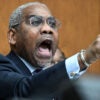Sen. Marco Rubio said he believes pastors must be both cautious and bold against an intrusive IRS that may be looking more carefully at their words from the pulpit after the Supreme Court ruled that there is a constitutional right to same-sex marriage.
“I think, long-term, it’s something we should be vigilant about,” Rubio, R-Fla., told The Daily Signal, adding:
We have an IRS that’s already targeted people for their political views. We have an IRS that’s targeted conservative groups for auditing, and special scrutiny, and so it’s not a stretch to say the next step would be that. We know that there are areas around the world already where Christianity is often defined as ‘hate speech,’ and therefore [Christians] become target of government sanction.
>>> Commentary: The Problem With the Investigation that Cleared the IRS’ Lois Lerner
Rubio has been a vocal critic of the Internal Revenue Service. During the 2013 scandal, where the agency admitted to targeting conservative groups for more stringent review, Rubio called its actions “reprehensible” and “deplorable.”
He put forward a bill to automatically terminate any IRS employee found to be “willfully” violating “the constitutional rights of the taxpayer.”
He said he worries in particular about how the actions of pastors and priests will be more scrutinized by the agency, but he insisted that clergy need to be bold nonetheless in speaking out about the cultural issues of the day.
“A lot of pastors and churches I’ve run into have become concerned about speaking truth on some of these issues because they don’t want people to be offended in the pulpit, because they don’t want to scare or drive people away,” Rubio told The Daily Signal, adding:
People want to hear happy talk sometimes when they show up to church. But I think those in the pulpit have an obligation to preach truth. And when it comes to Christianity, truth is often uncomfortable. It forces us to acknowledge that we’re sinners, that we sin on a daily basis, that what much of the world deems to be right is in fact not right, that what is legal doesn’t mean it’s proper.





























